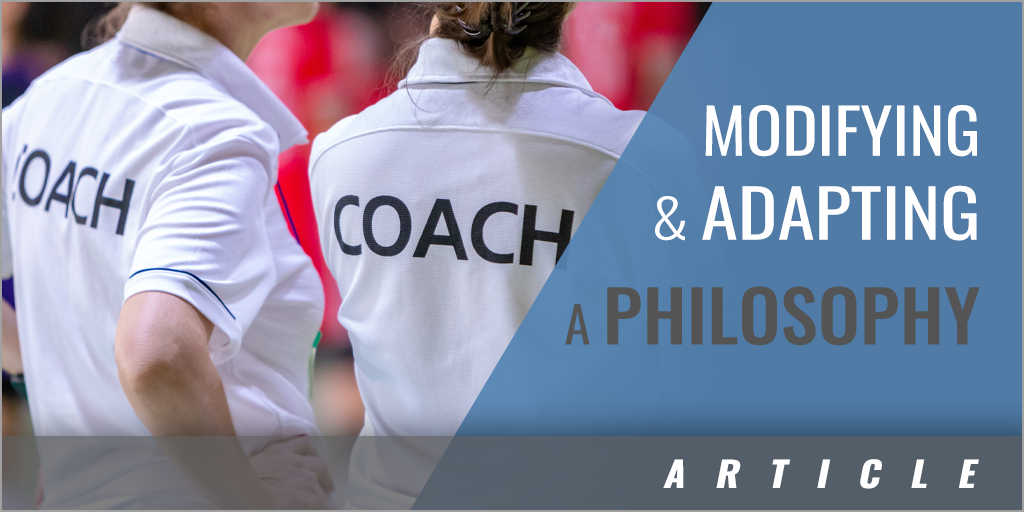|
By: Dan Gould & Cliff Mallett Originally Published in: Sport Coaches' Handbook Provided by: Human Kinetics Thus far we have examined the importance of developing a philosophy and putting it into action. The final step is to develop the ability to recognize when and how to adapt or modify your philosophy. Over time, your coaching philosophy will be tested, and standard practice would suggest reviewing your core values every season. To do so, ask yourself the questions provided in the Postseason Philosophy Reflection sidebar of the conclusion of each season. These questions, which can be found in a variety of coaching philosophy exercises, will help you address both the positive and the critical experiences of your season. It is best to conduct this review after some time has passed (e.g., a few weeks to a few months) since the conclusion of the season - when the season is still fresh in your mind but time has allowed any adverse situations or feelings to settle, thus enabling you to reflect with a clear head. Beyond the postseason self-evaluation of philosophy and actions, there are three other key situations in which coaches should evaluate, and if necessary, modify their philosophy. The first type of situation involves a change in coaching context. For instance, will you now be coaching for performance rather than for participation? Or will you be joining a new organization and therefore needing to align with a different programmatic mission statement? In the second type, there is a change in your athletes. For example, perhaps you are now working with veteran athletes rather than novices. Have you coached such athletes before? Do they have varied motives for their own involvement? Postseason Philosophy Reflection Do my athletes know what is important to me? Identify an incident that reinforced my philosophy and values. Identify an incident that challenged my philosophy and values. What were the consequences? How did I respond? Did I meet my goals and objectives for this season? How do I know? If my athletes described me to someone unfamiliar with my team, what would they say?
Was there an incident this season that I wish I could do over? Why? What would I do differently? The third type of situation, and arguably the most valuable and effective, involves evaluating through the lens of sheer experience or structured opportunities for reflective practice. Examples include coaching clinics and both formal and informal coach training, all of which provide valuable opportunities to talk with other coaches about your beliefs and behaviors. In these settings, experienced and novice coaches alike receive valuable input from their peers, and coaches of all levels should take advantage of such opportunities. Often, a casual conversation, occurring beyond the confines of the field or court, enables coaches to accurately reflect on and evaluate their beliefs and actions. Developing a coaching philosophy is a hallmark of highly effective coaches, yet all coaches must work to stick to their philosophy. As the Playing Time Versus Playing for Keeps sidebar dramatizes, all coaches sometimes struggle to adhere to their philosophy and, at times, may stray from it. Strategies for adhering to your philosophy include writing it down and posting it ("ink it, don't think it"), regularly reviewing it and modifying it as needed, reflecting on it at the beginning and end of each season, and empowering a trusted friend or assistant to hold you accountable. If you do get caught up in a situation and veer off course, what should you do? In part, it comes down to evaluation. As coaches, we spend considerable time evaluating our players, and in order to be most effective we also need to evaluate ourselves (for guiding questions, refer back to the Postseason Philosophy Reflection sidebar). But how do we evaluate our actions in the moment, especially when they may contradict our stated philosophy and values? To begin with, remember that modifying and evaluating your philosophy is a cyclical process; that is, your response to a situation, along with the consequences of that response, directly affect the need to modify or confirm your beliefs. For example, suppose that you coach hockey athletes of ages 8 to 10 - an age group where players start to become more competitive but are still young and need to focus on fun, participation, and skill development. One day, in the heat of a particularly competitive match, your emotions get the best of you. As a result, you change your consistent strategy of equal playing time in order to keep the best players on the ice and go for the win. Then you argue with the referee over a call and find yourself telling your players in a loud, demanding voice, "Don't be soft! Go after them and go after them hard." Later, as you head into the locker room with your players for a postgame talk, you know in your gut that you were out of control. What do you do now? One simple yet very effective strategy is to own your mistake. That is, tell your team what you did and why it was wrong. Apologize for your behavior and describe what would have been a better approach. Here is an example: "Wow. That was a tough match. There were some battles out there. I want us to take a few important things from this game. First, I was not a good example of controlling my emotions. I should not have argued with the ref, and I shouldn't have lost my cool. I apologize for calling you 'soft.' I let myself get too competitive instead of focusing on what we wanted to do. Second, it's really important to me that we work really hard. Third, it's also important to me that we keep getting better at skills, and to do that, we need to have fun playing. I am going to do a better job of keeping those things in my mind while I coach." It might also be a good idea, especially at this age level, to send a similar note to the parents and guardians of your players. That way, the message is consistently delivered. Such incidents provide a great opportunity for coaches to evaluate in the moment, acknowledge transgressions, and move forward in a better way. |







